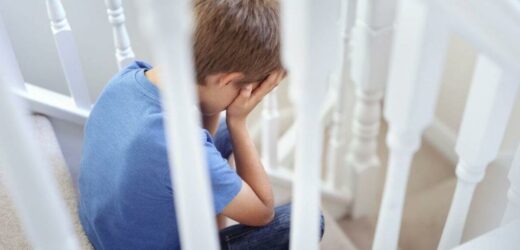Cost-of-living: Expert shares advice to save money on bills
We use your sign-up to provide content in ways you’ve consented to and to improve our understanding of you. This may include adverts from us and 3rd parties based on our understanding. You can unsubscribe at any time. More info
The cost-of-living crisis is impinging on the lives of British kids — in particular, those whose families were already faced with severe financial pressures — and risks amplifying existing mental health challenges among our children. This is the warning of educational psychologist Professor Vivian Hill of University College London, who explains that increased stress and anxiety is bad for one’s health — both mentally and physically — and especially at such a critical stage of life. According to the researcher, the shadow of the current economic crisis is already manifesting in unusual ways on the playground. While one might think of childhood as a time of freedom and innocence, she reports how she has seen kids as young as eight discussing how elderly neighbours may die this winter as a result of fuel costs and how “poor people don’t matter” to the Government.
To explore how parents might best engage their children with the current cost-of-living situation, Express.co.uk spoke with the author Hilary Robinson, whose books for children specialise in handling difficult topics — such as death, divorce and homelessness.
Her main advice, she says, “Is to be honest. Be honest about what’s going on. Be frank — and the most important thing is to listen to their questions.”
It can also help, she suggests, to engage them by asking how they might help the family cut back on costs — “they might suggest wearing an extra jumper, or they might suggest going exercise to warm up. Let them lead the discussion to a degree.
“Help them by reassuring them that everyone is in the same situation and that they are not alone. And also, the best thing to do if they are worried about anything, or they hear things from other children — that can really knock them, if they hear of somebody else having a really bad time — is to encourage them to talk about it.”

As Prof Hill notes, however, many children are already quite cognizant of the present cost-of-living crisis — with the situation being worse for some than others.
She told Express.co.uk: “I work in a school in a very deprived part of London, and the children there are very much aware of the cost of everything… even before the most recent hike in energy prices.
“It’s astounding to think you can have a conversation with an eight-year-old who knows how much it costs to run a bath, and to run the washing machine.
“They’re living in a climate where they’re really forced to be aware of the cost of things that most people take completely for granted.

Prof Hill continued: “I think what you notice with that is that there is a psychological angle — there is a sense of burden to those children.
“They aren’t just living the kind of spontaneous lifestyle that we assume is associated with children — they actually have a level of awareness of these things.”
As an example, Prof Hill points to one child she worked with who, despite struggling with literacy and other aspects of his learning, had developed an “amazing mathematical ability” — one driven by the need to understand the constraints imposed by his budget for food.
Prof Hill said: “The issue here is that while some parents might have the luxury of discussing these things with their children, and getting them involved in reducing electricity consumption and so on and so forth, for some children, it’s been an absolutely entrenched part of their entire development.
“I think, as a psychologist, to me what’s really powerful in all this is how some children are able to have a kind of ‘cognitive schema’ of the world that you perhaps wouldn’t see with children from more advantaged backgrounds.
“They really do understand the messages and the reality behind TV headlines because they live it. [They have] a really quite sophisticated level of understanding about what the impact of all things costing more is actually going to bring to their lives.”

The impact of crises like these differs from family to family, the psychologist said.
She explains: “For some children and families, they have a kind of resilient response to that context. They are going to overcome and they’re going to manage no matter what and they’re working together to do so. But for some families, it’s just utterly overwhelming.”
Either way, Prof Hill said, the entire life experience of these children is completely different to those children from more affluent families who have the luxury of not thinking about these things.
She continued: “The really worrying aspect of this is the impact of living under high levels of stress.
“We think of childhood as a period where you’re not burdened by the day-to-day stresses of life — that you’re cushioned from them and that that’s something that your parents are dealing with and you learn about later.”
However, she said, “some children are learning this at a frighteningly early age.
“We know that when you live with high levels of stress throughout your life, it actually has quite a considerable impact on your body at the physiological level as well as the psychological and emotional level. It certainly isn’t healthy.”
In fact, Prof Hill notes, data from the Office for National Statistics shows a clear correlation between the average age of death and affluence, with those in poorer communities tending to be more vulnerable to disease and early death.
She added: “When you’re under high levels of stress and anxiety, you have elevated levels of cortisol, you’re in that kind of flight-or-fight mode. It impacts on mental health.
“Children are often the forgotten victims of many political and social events.
“We already have really alarming statistics about the numbers of children in the UK who are presenting with mental health challenges — and that has been massively increasing over recent years. It escalated quite significantly during COVID and, you know, it’s probably set to increase again.”

Prof Hill notes that the present crisis appears to be manifesting in the worlds of some children to an extent that is perhaps unprecedented.
She explained that during a recent school visit, she witnessed a group of young pupils playing a game based on a TV chat show: “The conversation was actually about the chancellor having to back down on the 45p tax rate!
“These are primary school children who are aware of these issues. They’d obviously overheard conversations at the weekend on the media about just looking after rich people and the poor people don’t matter — and that was their exact conversation.
“They’d obviously heard on their way into school that the chancellor has had to take a U-turn on some of his policies. But they were still very clear that wasn’t going to make a difference for them and that they are heading into difficult times.
“I can’t remember hearing a conversation like that in the school playground in the last ten years.”
Prof Hill cited another conversation she observed among a group of eight-to-nine-year-olds having — “talking about elderly neighbours, and that some of them might die because they won’t be able to heat their homes. That’s an extraordinary conversation to overhear.”
She summed up: “Those children are acutely aware of their political context and their life context. Because it’s not new. This isn’t just happening now. [But] it is about to get one hell of a lot worse.”
DON’T MISS:
Climate change horror as vital English Heritage sites risk ‘collapse’ [INSIGHT]
‘Appeasing Putin’: Merkel draws fury over ‘no regrets’ claim [ANALYSIS]
Trojan war breakthrough as ‘rarest ever’ 1600-year-old mosaic found [REPORT]

For parents who are still wondering how to discuss the cost-of-living crisis with their children, however, Prof Hill does have some advice.
She said: “More hopeful narratives are more constructive. They do help build resilience.
“My sort of recommendation to parents is that I think children do need to be part of the discussion, but I think to present them with something that feels overwhelmingly negative and unmanageable can actually have a big impact on their mental health and wellbeing.
“So, at some level, we have to be thinking about a sense of ‘how do we cope with this?’ ”
Prof Hill continued: “There are food banks out there. So, ultimately, nobody should be starving.
“We know that some families are very sensitive about having to use those sorts of facilities and resources — and some will have to use that, perhaps for the first time ever in their lives.
“And it’s just such early days in this latest round of energy increases and [it is unclear] how it’s going to impact on children, and young people.”
“It’s that difficult balance between sharing enough that they understand what’s going on around them, but not sharing so much that they feel overwhelmed and burdened by it.”
The combination of 24-hour news and social media, Prof Hill notes, means that children today are exposed to an “awful lot” more worry and stress than they might have once been.
Parents, she said, could benefit from engaging their children with a narrative “that tries to keep some perspective — that things have been bad like this in the past, and as a society, we’ve come out the other end.
“So, I think, some sense of hope, and some sense of agency in terms of what you can do to help manage it.”
Prof Hill points to such practical measures as not running taps for long periods of time, throwing on an extra jumper, not leaving lights on in empty rooms — but also in the importance of pulling together as a community.
She concluded: “I think it’s just crucial that we try to keep some sense of hope on the horizon.”
Source: Read Full Article


